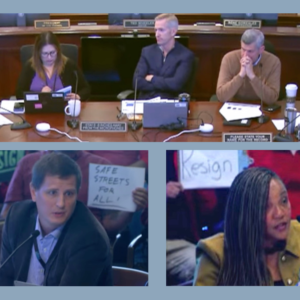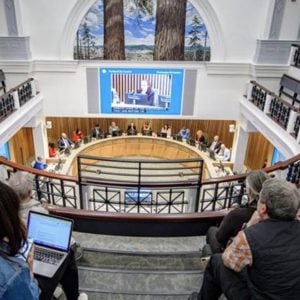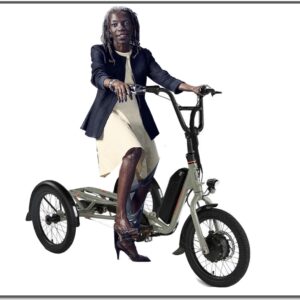It’s no secret that PBOT faces historic budget cuts. But there’s a big part of the conversation that hasn’t really gotten the attention it deserves: With gas tax and other motor vehicle-related revenues (like parking meters and registration fees) decreasing, more people choosing bikes and electric cars, and federal funding as unstable as ever, we need to figure out a new revenue stream.
Unfortunately, this discussion is hampered by politics. Raising the cost of using our transportation system is always makes for prickly politics, but especially in the current economic climate, elected officials around the region are loathe to propose new revenue streams. At the outset of this year’s budget talks at PBOT, Mayor Sam Adams — a man who pushed a major “street fee” initiative a few years ago — told his bureau director that he did not want to hear any ideas about new revenue. All talks about how to find more money, Adams said, were off the table.
To help them hammer out the budget PBOT enlisted a Budget Advisory Committee made up of citizen activists and professional advocates (including members from the Willamette Pedestrian Coalition, the Bicycle Transportation Alliance, OHSU, the Small Business Advisory Council, the Portland Business Alliance, unions, and more). The BAC’s role is to help prioritize spending and cuts and to issue a formal letter of recommendation (or not) at the end of the process.
In that letter, dated January 17th, the BAC wrote:
“If council is unwilling to entertain new revenue to aid PBOT, as indicated, we reluctantly support the adoption of this proposed budget — though we agonize over its outcomes.”
In thinking about the future of the gas tax, the BAC noted that the funding formula PBOT relies on (set by resolution with Multnomah County) is also tied to vehicle registrations — which continue to fall as people switch to public transit and bikes:
“If the Portland Plan is successful, and 75% of all work trips are by modes other than car in 2035, our annual intake of gas tax revenue will by then have an effective yield of zero.”
With PBOT relying on what the BAC referred to as “a waning funding stream,” the agency’s ability to meet basic needs of the system are at risk.
To help them move forward from this dire position, the BAC gave the Portland City Council four specific recommendations. In addition to adopting the 2012-2013 budget and raising the cap on a Utility License Fee revenue stream that was reduced by Council in 2008, the BAC had two other, more pointed, pieces of advice.
The first one is to immediately put together a committee to, “consider a range of broad-based revenue options.” This new committee, the BAC recommends, should report their findings to Council no later than October 1, 2012.
The other bit of advice the BAC gave to Council reads more like a slap on the wrist. “In the future,” reads the letter, “we urge Council to refrain from directing PBOT to create new programs and projects without new dedicated funding sources that are attached or found first…”
The future discussion about a new funding stream can’t happen soon enough. And there are loads of interesting and feasible ideas. PBOT Director Tom Miller has publicly stated he’d like to look further into variable/dynamic parking meter pricing. BTA Executive Directory Rob Sadowsky has said he’s like to see more red-light cameras to enforce traffic violations with the revenue going to funding transportation safety projects. There’s also a growing appetite for congestion pricing and various tolling schemes. As part of their Active Transportation Plan, Metro seems to be laying the groundwork for a regional bond measure that would fund transportation infrastructure.
The politics around this issue will remain tricky; but in Portland, the timing could be right. We’re poised for a possible new majority on City Council next year. With a new mayor, at least one new commissioner and another (Amanda Fritz) who faces a tough re-election battle, now might be a great time for bold ideas to take hold. Stay tuned.







Thanks for reading.
BikePortland has served this community with independent community journalism since 2005. We rely on subscriptions from readers like you to survive. Your financial support is vital in keeping this valuable resource alive and well.
Please subscribe today to strengthen and expand our work.
1. Charging (increasing) fees for the behaviors/modes we’d like to discourage or recognize as problematic or that have no future, and incentivizing those we’d prefer has long been an obvious strategy.
2. If we want to (and we may not) look at this by mode, some modes require more expensive infrastructure, maintenance, etc. than others. The lifecycle cost to society of a passenger mile in a car is going to be higher than a passenger mile on foot, for instance. We might want to flesh that out a bit more (if it hasn’t already been done) and check to see whether we could realign or reprioritize our spending along the lines of #1. above.
You always get less of what you tax. And, besides, is using the tax code to punish some behaviors an appropriate use of state police power?
A $.01 per pound annual vehicle assessment for vehicles using public roadways. A 3,000 lbs car costs $30. My 30 lbs bike costs $.30. Heck, go crazy and round that up to the nearest $1. Also removes the argument that cyclists aren’t paying their fair share.
Except that your bike doesn’t weigh 30 lbs, it weighs on average 180 lbs. If the logic is to pay based on damage to the roads, one must consider the average loaded weight (or perhaps the Gross Vehicle Weight Rating, the max weight the vehicle is rated for). For a bike, that’s about 180 lbs, for a car, it’s 3,360 lbs if you presume 2 occupants on average.
I can see the Oregonian headline already…
In all seriousness, there are countless areas around the city where parking on the street is an absolute nightmare. This is not efficient use of public space, and wastes energy and time. It’s unfortunate that our parking division is run by crooked idiots. We should have market-priced meters downtown and in all areas where more than 70% of the parking is consistently occupied.
Charging for parking is the easiest short-term solution. Most central city neighborhoods have limited street parking, and most of it is given away for free, or for a very low price.
Market-rate parking (e.g. revenue-maximizing parking rates) would make it easier to find a parking space for those who choose to drive, while providing enough money to repave the roads and continue to improve bus, bike and pedestrian alternatives, for those who do not want to pay for parking.
Even setting rates below the revenue-maximizing rate (say, charging enough to keep 20% of spots open, as Shoup recommends) would raise millions of dollars per year, and greatly improve parking access.
Off-street parking lots should also have a high city tax, say $5 or $10 a day per space downtown, to encourage lot owners to build something useful instead.
Residential areas with limited parking could have monthly parking permits, which will help free up street parking spaces (may people don’t park in the garage that they own) and pay to keep residential streets paved.
Raising the gas tax would be nice, but parking can be done right away, and will actually make life much better for drivers.
Instead of creating a special tax just for private parking downtown, the city have a minimum property value for downtown space. For example, a 2 story building would have the same taxable value as a parking lot. This would make each spot in that lot very costly, and encourage denser development.
I agree with you but, the problem with market based pricing is that inevitably, someone will complain that it it further divides society into haves and have nots etc… This happens any time someone puts forward a proposal to correctly price gas, roads, electricity, parking, bridges, water usage and so on.
Most of the people here on BikePortland seem to get these issues; the supply and demand of transportation resources and efficient use there of. There’s no way the City is going to emphasis pavement over multi modal options anymore; it’s just not rational. No large urban city anywhere in the world emphasizes cars for transport. The next step is to build support for these policies. Please talk to your neighbors and friends if you have the chance to help build support for progressive policies. This City will flounder without thoughtful public support for policies that help us grow smartly.
Smart growth policies reduce freedom, contribute to homelessness, and fail to prevent environmental harm.
repeating a talking point again and again does not make it true. perhaps you’d care to back up your statement with a fact or two. or is that not your thing…
I believe in your freedom to pay over $4.00 a gallon to move your 4000lb vehicle dozens of miles each day as your only option for mobility.
Please don’t force your freedom onto me.
“In thinking about the future of the gas tax, the BAC noted that the funding formula PBOT relies on (set by resolution with Multnomah County) is also tied to vehicle registrations — which continue to fall as people switch to public transit and bikes:
“If the Portland Plan is successful, and 75% of all work trips are by modes other than car in 2035, our annual intake of gas tax revenue will by then have an effective yield of zero.”
I’m of two minds about this. In the medium to long term it is probably true: not so much automobility in our future; but in the meantime we’re driving about the same number of miles we have for the past twenty years. It is not as if we’d experienced an implosion in VMT here in Multnomah Co. (unless I missed it). Which I think points to the decline in purchasing power of the gas tax RATE as the source of the revenue problems, more than the much ballyhooed decline in driving.
I’m not sure we need to make this more complicated than it is. Raise the gas tax. Despite all the reflexive talk of how ‘this is politically infeasible,’ raising the gas tax will not be the hardest thing we’re going to have to do in the years to come.
I’d like to borrow a play from the republicans and starve the beast. It’s not clear to me why we need new revenue streams, if it just means that the current motor-vehicle dominated paradigm is going to continue.
Perhaps I’m bad at reading between the lines.
Or is “new revenue streams” just code words for making drivers finally pay their share, and getting rid of the subsidies for motor vehicle users. That I could get behind.
It is a code, I believe.
The problem with starving the beast is that the current infrastructure favors auto travel greatly. We need road spending, because we need bike/ped improvements. Now, if they were to halt all road expansion and switch to maintenance only with some money going to new bike/ped infrastructure, I’m sure they could get by with their current revenue.
I attended one of Adams’ townhall meetings and told him and the crowd that I opposed the utility fee concept because it failed to differentiate between actual transportation impacts of households, but that I would support a gas tax rate increase of ANY amount.
As others have pointed out we should tax activities to discourage overuse or over-consumption. Costs should certainly match the impacts. That’s not our current structure.
A gas tax is actually a pretty good tax structure because it exacts a fee for use of the roads and penalizes overly large vehicles in much the same way that British Columbia’s carbon tax does.
The problem is that gas tax has not kept pace with inflation or the even-faster construction cost index.
Federal gas tax has been stuck at 18.4 cents per gallon since 1993. Oregon’s tax was 24 and was recently raised to 30 cents per gallon (a 25% increase). Since 1993, the construction cost index has increased by 66 percent.
Raise the gas tax so we don’t have to make false choices between autos, trucks, transit, pedestrians, and bicyclists and their legitimate needs.
No, why is it appropriate to use taxing authority to disincentivize or punish behaviors that you or other self-appointed “smart” people deem harmful or simply inconvenient?
New revenue stream is merely code for more taxes. Just like Obama’s nonsense aboiut “investments” in transportation, technology, energy, and education is simply code for jacking up taxes.
Look, if you wanna pay higher gas taxes, then simply write a check to the city and state government. Do not attempt to limit the liberty and freedom of others on some do-gooder nonsense that harms people rather than helps them.
which people? does public transportation harm the poor? do bike lanes harm cyclists? it seems to me that when you mean people, you actually mean the selfish rich.
Fuel taxes pay for road maintenance. We tax cars to pay for the damage they induce on our road system, because we need a functioning road system for commerce. These taxes have not kept up with inflation or been adjusted for improved fuel economy of newer cars.
How do you suggest we pay for our roads? Through property taxes? Sales tax?
see, people like Jon want all the services government provides, like well-paved roads, safe drinking water, and sewage treatment/clean rivers, but they don’t want to pay for them.
I don’t own a car, but I would love to pay more into the system because it’s in decrepit shape from the viewpoint of a pedestrian and bicyclist. On the eastside where I live, there are fewer paved streets and far fewer sidewalks. I’m tired of walking on gravel roads with potholes that remind me of the great lakes. I could stomach $10 a month to finally fix these roads. Combined with 300,000 households, that would be $3million a month. seems like a lot could get done on such a minimal contribution. Businesses could pay too, since they have more to gain and bam! we could just solve the problem and have one of the best transportation systems in the country!
What’s stopping you from sending that extra ten bucks to PBOT every month?
How about we issue moving violations to bikes that run stop signs. Now there is a reliable revenue stream.
you know, Styrex, even the PPB has moved on, concedes that this is not a priority for them (see their training video). Maybe we can just let this go. A person on a bike whose movements suggest to you that he is failing to pay due respects to the stop sign poses a danger to other traffic participants on par with someone wearing spiky heels. It may be personally annoying to you to have to witness this behavior, but statistically the danger is trivial.
But distracted driving, now there’s something to get worked up about.
“New data released today by NHTSA using its refined methodology show an estimated 3,092 fatalities in distraction-affected crashes in 2010.”
http://www.distraction.gov/content/press-release/2011/12-8.html
Or we could issue citations to all of the drivers that run stop signs, or speed, or run red lights.
I don’t know about you, but I would rather be hit by a bike running a stop sign than a 4,000lb car running a stop sign; but hey, whatever floats your boat.
Wow, lots of great comments here. Nom, I like your thinking. But just to play devil’s advocate….I ride a bike, but I often do bike moves too. With a fully loaded trailer, my whole vehicle weight (including driver) can be 500lbs vs. 200lbs normally. So I should pay $5.00 all the time, or just some of the time? I also think the gentrification issues have not been addressed here. There are neighborhoods in Portland that have A LOT of money (south of Reed College, Alameda Ridge, Laurelhurst). I would love to see a wealth tax on properties above $400k value (I would be very very surprised if any of them ride a bike).
With regards to the parking fee, Adams tried to propose parking meters on SE Hawthorne and the business assoc. ran him through the wringer. If we want real change, we have to find a way to reduce the capability of destroying the momentum on such projects. I like the gas tax, I also like red light cameras (the former punishes car inefficiency and the latter punishes dangerously illegal driving). Lastly, it should be kept in mind that some revenue streams can cost more to run than they bring in. This was the issue with a bicycle registration fee. That’s why raising an existing tax is more efficient